2012年秋新版牛津英语7A unit7 shoppiong教案
- 格式:doc
- 大小:187.00 KB
- 文档页数:16
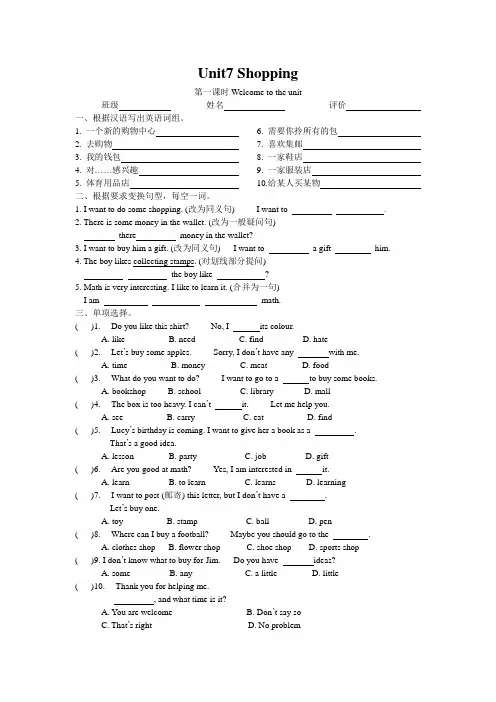
第一课时Welcome to the unit班级姓名评价一、根据汉语写出英语词组。
1. 一个新的购物中心2. 去购物3. 我的钱包4. 对……感兴趣5. 体育用品店6. 需要你拎所有的包7. 喜欢集邮8. 一家鞋店9. 一家服装店10.给某人买某物二、根据要求变换句型,每空一词。
1. I want to do some shopping. (改为同义句) I want to .2. There is some money in the wallet. (改为一般疑问句)there money in the wallet?3. I want to buy him a gift. (改为同义句) I want to a gift him.4. The boy likes collecting stamps. (对划线部分提问)the boy like ?5. Math is very interesting. I like to learn it. (合并为一句)I am math.三、单项选择。
( )1. ---Do you like this shirt? ---No, I its colour.A. likeB. needC. findD. hate( )2. ---Let’s buy some apples. ---Sorry, I don’t have any with me.A. timeB. moneyC. meatD. food( )3. ---What do you want to do? ---I want to go to a to buy some books.A. bookshopB. schoolC. libraryD. mall( )4. ---The box is too heavy. I can’t it. ---Let me help you.A. seeB. carryC. eatD. find( )5. ---Lucy’s birthday is coming. I want to give her a book as a .---That’s a good idea.A. lessonB. partyC. jobD. gift( )6. ---Are you good at math? ---Yes, I am interested in it.A. learnB. to learnC. learnsD. learning( )7. ---I want to post (邮寄) this letter, but I don’t have a .---Let’s buy one.A. toyB. stampC. ballD. pen( )8. ---Where can I buy a football? ---Maybe you should go to the .A. clothes shopB. flower shopC. shoe shopD. sports shop( )9. I don’t know what to buy for Jim. Do you have ideas?A. someB. anyC. a littleD. little( )10. ---Thank you for helping me.--- , and what time is it?A. You are welcomeB. Don’t say soC. That’s rightD. No problem第二课时Reading班级姓名评价一、根据汉语写出英语词组。
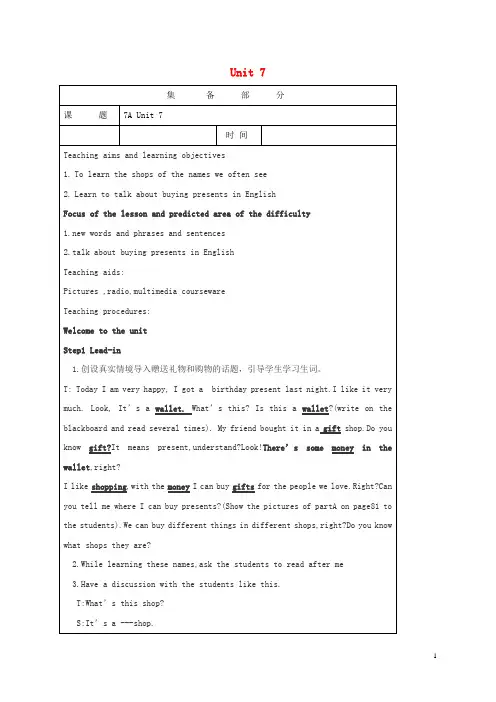
Unit 71.Ask the Ss to talk about their own ideas about what to buy and where to buy it.2.Have a commniucation with them.3.Make up similar dialogue in pairs.4.Act out their dialogueComic stripStep(1 )PresentionT:Thanks for giving me some ideas.I’ll take your ideas when I go shopping.I like shopping,what about you?1.show pictures about Hobo and Eddie,then always bring us much fun ,right?What will happen this week? Let’s have a look together,OK?now Hobo is going shopping and he asks Eddie to go with him.Do you think Eddie will do that?1.Let the Ss guess the answer first2.Listen to the tape and answer question(1)Why does Hobo ask Eddie to go with him?(Because he wants Eddie to carry all the bags.)3.Read the dialogue and find out the difficultiesneed---to do sth 需要去做某事hate sth=don’t like sth (give more examples) Step(2 )Practicee the words and phrases to complete the passageGo shopping carry all the bags wallet come withNeed to down the street hates moneyTh ere’s a new mall_________.Hobo wants to ___________,but Eddie___________it.Hobo has no________so Eddie gives his_______to Hobo.Hobo can’t_________.He’s asking Eddie for help,”Eddie,please__________me,I ____you ____ help me.2Check the answers and read together.3.Read the dialogue in roles in pairs.4.Act out the dialogue in roles,encourage the Ss to come up with their own ideas.。
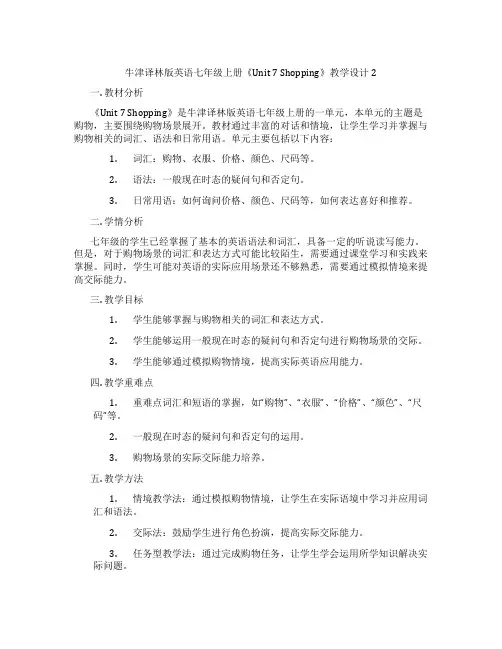
牛津译林版英语七年级上册《Unit 7 Shopping》教学设计2一. 教材分析《Unit 7 Shopping》是牛津译林版英语七年级上册的一单元,本单元的主题是购物,主要围绕购物场景展开。
教材通过丰富的对话和情境,让学生学习并掌握与购物相关的词汇、语法和日常用语。
单元主要包括以下内容:1.词汇:购物、衣服、价格、颜色、尺码等。
2.语法:一般现在时态的疑问句和否定句。
3.日常用语:如何询问价格、颜色、尺码等,如何表达喜好和推荐。
二. 学情分析七年级的学生已经掌握了基本的英语语法和词汇,具备一定的听说读写能力。
但是,对于购物场景的词汇和表达方式可能比较陌生,需要通过课堂学习和实践来掌握。
同时,学生可能对英语的实际应用场景还不够熟悉,需要通过模拟情境来提高交际能力。
三. 教学目标1.学生能够掌握与购物相关的词汇和表达方式。
2.学生能够运用一般现在时态的疑问句和否定句进行购物场景的交际。
3.学生能够通过模拟购物情境,提高实际英语应用能力。
四. 教学重难点1.重难点词汇和短语的掌握,如“购物”、“衣服”、“价格”、“颜色”、“尺码”等。
2.一般现在时态的疑问句和否定句的运用。
3.购物场景的实际交际能力培养。
五. 教学方法1.情境教学法:通过模拟购物情境,让学生在实际语境中学习并应用词汇和语法。
2.交际法:鼓励学生进行角色扮演,提高实际交际能力。
3.任务型教学法:通过完成购物任务,让学生学会运用所学知识解决实际问题。
六. 教学准备1.准备相关购物场景的图片、视频或实物,以便进行情境教学。
2.准备购物对话的剧本,供学生进行角色扮演和操练。
3.准备购物任务,让学生在实际操作中应用所学知识。
七. 教学过程1.导入(5分钟)通过展示购物场景的图片或视频,引导学生谈论购物话题,激发学生的兴趣。
教师提问:“你们最喜欢的购物场所是什么?为什么?”让学生自由发表意见。
2.呈现(10分钟)教师展示购物对话的剧本,让学生跟读并模仿。
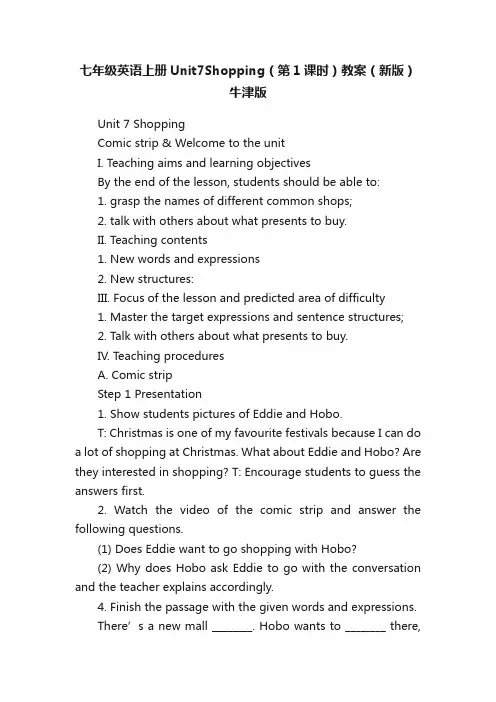
七年级英语上册Unit7Shopping(第1课时)教案(新版)牛津版Unit 7 ShoppingComic strip & Welcome to the unitI. Teaching aims and learning objectivesBy the end of the lesson, students should be able to:1. grasp the names of different common shops;2. talk with others about what presents to buy.II. Teaching contents1. New words and expressions2. New structures:III. Focus of the lesson and predicted area of difficulty1. Master the target expressions and sentence structures;2. Talk with others about what presents to buy.IV. Teaching proceduresA. Comic stripStep 1 Presentation1. Show students pictures of Eddie and Hobo.T: Christmas is one of my favourite festivals because I can do a lot of shopping at Christmas. What about Eddie and Hobo? Are they interested in shopping? T: Encourage students to guess the answers first.2. Watch the video of the comic strip and answer the following questions.(1) Does Eddie want to go shopping with Hobo?(2) Why does Hobo ask Eddie to go with the conversation and the teacher explains accordingly.4. Finish the passage with the given words and expressions.There’s a new mall ________. Hobo wants to ________ there,but Eddie _________ shopping. Hobo ’t ________. He is as king Eddie for . Give them necessary next?Can you give me your ideas?T: Ask students to continue the conversation using their own creativeness and imagination. Invite some students to act out their conversations. The teacher gives positive comments on their performance.Step 3 Sum upT: When we buy presents for others, we needn’t spend too much money on it because as students, we don’t make any money. We should spend our pocket money wisely, do you think so? What matters is the love in the gift, not the price of it. As the saying goes, a small gift can mean a lot.B. Welcome to the unitStep 1 Lead-in1. Enjoy the song Jingle bells (before class).T: Hello, everyone! Do you enjoy this song? It’s a song about Christmas. As we know, Christmas is a time for fun. It is also a time for presents and shopping. There are many different kinds of shops in your town or city. Here, I the names of these shops.2. Ask students to write down the names of the shops under the pictures on Page 81 and then check the answers with their partners.3. Let students practise reading these names of shops and ask them to brainstorm the things we can buy in these shops.4. Present pictures of more shops, such as department store, electric shop, stationery shop, pharmacy and convenience store.5. Show students a shopping list: some chocolates, a teddy bear, a basketball, a wallet, a pair of leather shoes, some flowers,a scarf and some books.T: Boys and girls, I buy them?T: Encourage students to work in pairs and ask and answer the following questions. S1: What does Miss Liu want to buy?S2: She wants to buy …S1: Where can she buy …?S2: She can buy … in ….Step 2 PresentationT: As we know, it is a tradition to give Christmas presents to family members and friends in some Western countries. Daniel wants to buy a Christmas present for Simon. He is asking Millie for to their conversation carefully and tell me what present they decide to buy.1. Let students listen to the tape and answer the following questions.(1) What does Daniel want to buy for Simon?(2) Why does Daniel want to buy these things for Simon?(3) Where can Daniel buy these things?2. Let students read the conversation together sentence by sentence and explainthe difficult points if necessary.3. Ask students to practise reading the conversation by themselves.Step 3 Practice1. Show students a picture of TF boys and ask them to give ideas about buying presents for them, using the structures: Maybe they are (not) interested in …What about (buying) …? Why not buy …?2. Ask students to work in pairs and make up a new conversation about buying presentsfor TF boys, using Daniel and Millie’s conversation as a model.S1: Christmas is coming. I want to buy ... for TF boys. Do you ...S2: Then you can buy ... I think they like ...S1: That’s a good idea. Where can I buy ...?S2: You can buy ... in ...S1: Thank you very much.S2: You’re welcome.3. Help students polish their conversations and give them three minutes to prepare for acting.4. Invite some students to act out their conversations and give them someencouragements and comments.V. Homework1. Memorize the new words, expressions and sentence structures;2. Write a conversation about shopping;3. Preview Reading.。
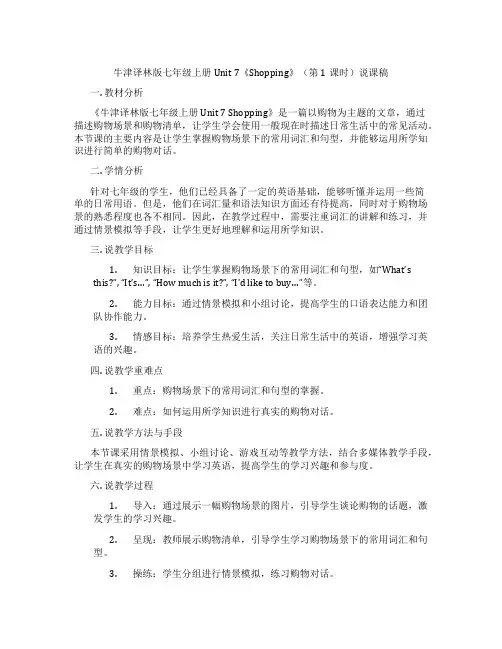
牛津译林版七年级上册Unit 7《Shopping》(第1课时)说课稿一. 教材分析《牛津译林版七年级上册Unit 7 Shopping》是一篇以购物为主题的文章,通过描述购物场景和购物清单,让学生学会使用一般现在时描述日常生活中的常见活动。
本节课的主要内容是让学生掌握购物场景下的常用词汇和句型,并能够运用所学知识进行简单的购物对话。
二. 学情分析针对七年级的学生,他们已经具备了一定的英语基础,能够听懂并运用一些简单的日常用语。
但是,他们在词汇量和语法知识方面还有待提高,同时对于购物场景的熟悉程度也各不相同。
因此,在教学过程中,需要注重词汇的讲解和练习,并通过情景模拟等手段,让学生更好地理解和运用所学知识。
三. 说教学目标1.知识目标:让学生掌握购物场景下的常用词汇和句型,如“What’sthis?”, “It’s…”, “How much is it?”, “I’d like to buy…”等。
2.能力目标:通过情景模拟和小组讨论,提高学生的口语表达能力和团队协作能力。
3.情感目标:培养学生热爱生活,关注日常生活中的英语,增强学习英语的兴趣。
四. 说教学重难点1.重点:购物场景下的常用词汇和句型的掌握。
2.难点:如何运用所学知识进行真实的购物对话。
五. 说教学方法与手段本节课采用情景模拟、小组讨论、游戏互动等教学方法,结合多媒体教学手段,让学生在真实的购物场景中学习英语,提高学生的学习兴趣和参与度。
六. 说教学过程1.导入:通过展示一幅购物场景的图片,引导学生谈论购物的话题,激发学生的学习兴趣。
2.呈现:教师展示购物清单,引导学生学习购物场景下的常用词汇和句型。
3.操练:学生分组进行情景模拟,练习购物对话。
4.巩固:学生通过游戏互动,进一步巩固所学知识。
5.拓展:学生分组讨论,设想自己要去购物,列出购物清单,并准备一段购物对话。
6.展示:学生上台展示自己的购物对话,其他学生进行评价。
7.总结:教师对本节课的内容进行总结,强调购物场景下的常用词汇和句型。
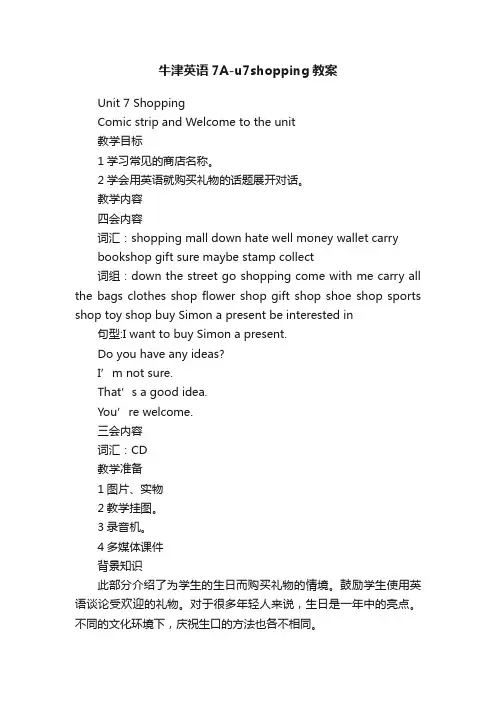
牛津英语7A-u7shopping教案Unit 7 ShoppingComic strip and Welcome to the unit教学目标1学习常见的商店名称。
2学会用英语就购买礼物的话题展开对话。
教学内容四会内容词汇:shopping mall down hate well money wallet carrybookshop gift sure maybe stamp collect词组:down the street go shopping come with me carry all the bags clothes shop flower shop gift shop shoe shop sports shop toy shop buy Simon a present be interested in句型:I want to buy Simon a present.Do you have any ideas?I’m not sure.That’s a good idea.You’re welcome.三会内容词汇:CD教学准备1图片、实物2教学挂图。
3录音机。
4多媒体课件背景知识此部分介绍了为学生的生日而购买礼物的情境。
鼓励学生使用英语谈论受欢迎的礼物。
对于很多年轻人来说,生日是一年中的亮点。
不同的文化环境下,庆祝生口的方法也各不相同。
送人生日礼物的传统很早以前起源千欧洲。
人们认为在朋友生日那天带着美好的愿望去拜访.可以保护朋友免受邪恶的伤害。
而礼物更能保护朋友,使其免受那些意欲占据其身体的恶魔的侵害。
不同的国家也有着一些相似的传统。
很多传统都把蜡烛和蛋糕作为庆祝的一部分。
在英国,有专门为庆典而准备的特别的生日蛋糕。
一些人认为放一枚硬币在蛋糕里将使寿星变得富有。
教学步骤Welcome to the unitStep I导入1创设真实情境导入赠送礼物和购物的话题。
在课前了解当天是否有学生过生日,如果有,教师可以将事先准备好的生日礼物送给这位学生并说:Happy birthday. 如果当天没有,也可以把礼物送给最近过生口的学生。
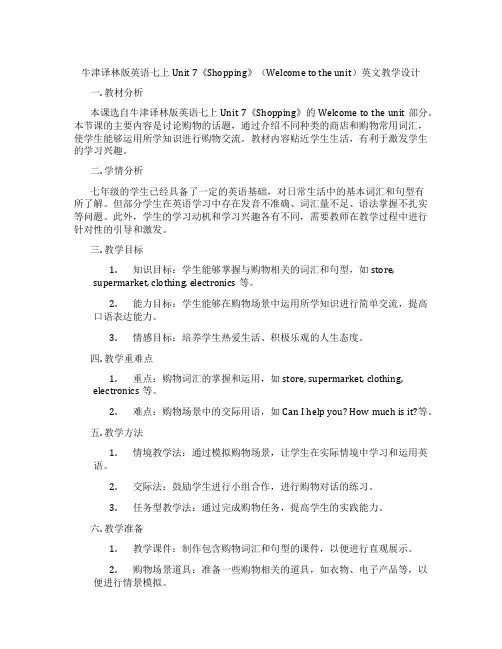
牛津译林版英语七上Unit 7《Shopping》(Welcome to the unit)英文教学设计一. 教材分析本课选自牛津译林版英语七上Unit 7《Shopping》的Welcome to the unit部分。
本节课的主要内容是讨论购物的话题,通过介绍不同种类的商店和购物常用词汇,使学生能够运用所学知识进行购物交流。
教材内容贴近学生生活,有利于激发学生的学习兴趣。
二. 学情分析七年级的学生已经具备了一定的英语基础,对日常生活中的基本词汇和句型有所了解。
但部分学生在英语学习中存在发音不准确、词汇量不足、语法掌握不扎实等问题。
此外,学生的学习动机和学习兴趣各有不同,需要教师在教学过程中进行针对性的引导和激发。
三. 教学目标1.知识目标:学生能够掌握与购物相关的词汇和句型,如store,supermarket, clothing, electronics等。
2.能力目标:学生能够在购物场景中运用所学知识进行简单交流,提高口语表达能力。
3.情感目标:培养学生热爱生活、积极乐观的人生态度。
四. 教学重难点1.重点:购物词汇的掌握和运用,如store, supermarket, clothing,electronics等。
2.难点:购物场景中的交际用语,如Can I help you? How much is it?等。
五. 教学方法1.情境教学法:通过模拟购物场景,让学生在实际情境中学习和运用英语。
2.交际法:鼓励学生进行小组合作,进行购物对话的练习。
3.任务型教学法:通过完成购物任务,提高学生的实践能力。
六. 教学准备1.教学课件:制作包含购物词汇和句型的课件,以便进行直观展示。
2.购物场景道具:准备一些购物相关的道具,如衣物、电子产品等,以便进行情景模拟。
3.录音机和磁带:准备购物场景的录音,以便进行听力练习。
七. 教学过程1.导入(5分钟)利用图片或实物展示购物场景,引导学生谈论购物话题,激发学生的学习兴趣。
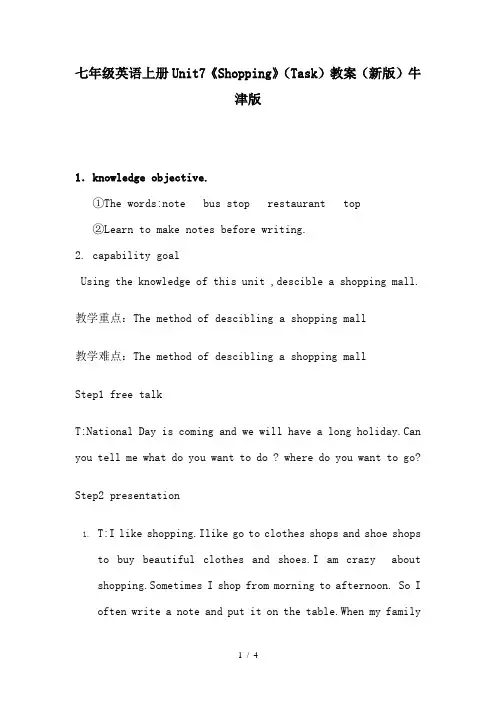
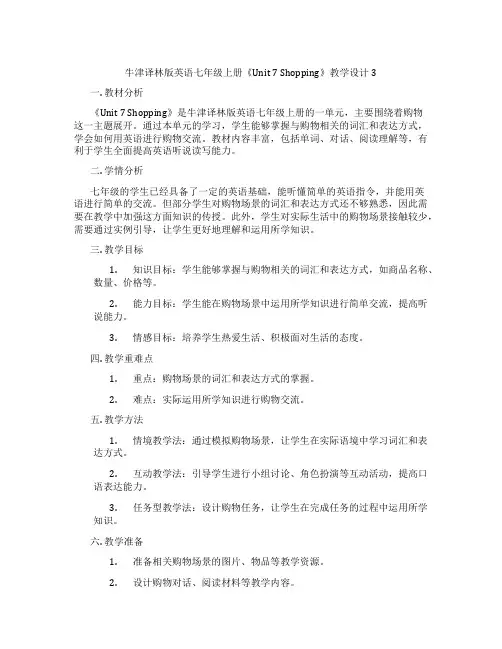
牛津译林版英语七年级上册《Unit 7 Shopping》教学设计3一. 教材分析《Unit 7 Shopping》是牛津译林版英语七年级上册的一单元,主要围绕着购物这一主题展开。
通过本单元的学习,学生能够掌握与购物相关的词汇和表达方式,学会如何用英语进行购物交流。
教材内容丰富,包括单词、对话、阅读理解等,有利于学生全面提高英语听说读写能力。
二. 学情分析七年级的学生已经具备了一定的英语基础,能听懂简单的英语指令,并能用英语进行简单的交流。
但部分学生对购物场景的词汇和表达方式还不够熟悉,因此需要在教学中加强这方面知识的传授。
此外,学生对实际生活中的购物场景接触较少,需要通过实例引导,让学生更好地理解和运用所学知识。
三. 教学目标1.知识目标:学生能够掌握与购物相关的词汇和表达方式,如商品名称、数量、价格等。
2.能力目标:学生能在购物场景中运用所学知识进行简单交流,提高听说能力。
3.情感目标:培养学生热爱生活、积极面对生活的态度。
四. 教学重难点1.重点:购物场景的词汇和表达方式的掌握。
2.难点:实际运用所学知识进行购物交流。
五. 教学方法1.情境教学法:通过模拟购物场景,让学生在实际语境中学习词汇和表达方式。
2.互动教学法:引导学生进行小组讨论、角色扮演等互动活动,提高口语表达能力。
3.任务型教学法:设计购物任务,让学生在完成任务的过程中运用所学知识。
六. 教学准备1.准备相关购物场景的图片、物品等教学资源。
2.设计购物对话、阅读材料等教学内容。
3.准备听力材料,以便进行听力训练。
七. 教学过程1.导入(5分钟)利用图片、物品等教学资源,创设购物场景,引导学生谈论购物话题,激发学生兴趣。
2.呈现(10分钟)展示购物场景的图片,引导学生说出所看到的物品和价格。
然后给出一段阅读材料,让学生阅读并回答相关问题。
3.操练(10分钟)将学生分成小组,每组设计一个购物场景,让学生用英语进行角色扮演。
鼓励学生大胆开口,注意语音、语调的准确性。
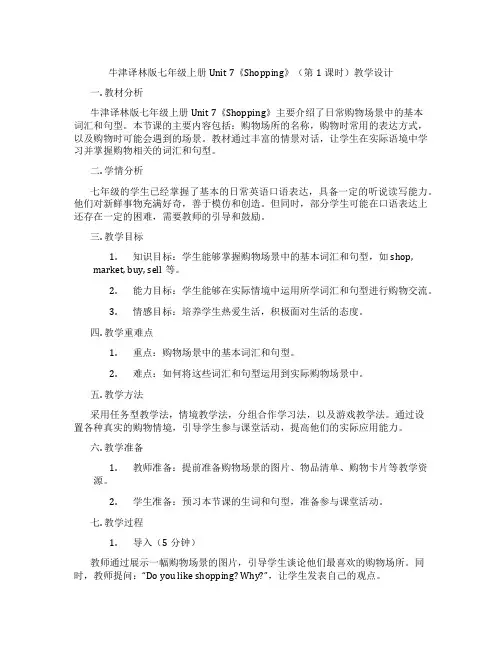
牛津译林版七年级上册Unit 7《Shopping》(第1课时)教学设计一. 教材分析牛津译林版七年级上册Unit 7《Shopping》主要介绍了日常购物场景中的基本词汇和句型。
本节课的主要内容包括:购物场所的名称,购物时常用的表达方式,以及购物时可能会遇到的场景。
教材通过丰富的情景对话,让学生在实际语境中学习并掌握购物相关的词汇和句型。
二. 学情分析七年级的学生已经掌握了基本的日常英语口语表达,具备一定的听说读写能力。
他们对新鲜事物充满好奇,善于模仿和创造。
但同时,部分学生可能在口语表达上还存在一定的困难,需要教师的引导和鼓励。
三. 教学目标1.知识目标:学生能够掌握购物场景中的基本词汇和句型,如shop,market, buy, sell等。
2.能力目标:学生能够在实际情境中运用所学词汇和句型进行购物交流。
3.情感目标:培养学生热爱生活,积极面对生活的态度。
四. 教学重难点1.重点:购物场景中的基本词汇和句型。
2.难点:如何将这些词汇和句型运用到实际购物场景中。
五. 教学方法采用任务型教学法,情境教学法,分组合作学习法,以及游戏教学法。
通过设置各种真实的购物情境,引导学生参与课堂活动,提高他们的实际应用能力。
六. 教学准备1.教师准备:提前准备购物场景的图片、物品清单、购物卡片等教学资源。
2.学生准备:预习本节课的生词和句型,准备参与课堂活动。
七. 教学过程1.导入(5分钟)教师通过展示一幅购物场景的图片,引导学生谈论他们最喜欢的购物场所。
同时,教师提问:“Do you like shopping? Why?”,让学生发表自己的观点。
2.呈现(10分钟)教师展示购物场景的图片,引导学生说出相应的词汇,如shop, market, buy, sell等。
同时,教师通过情境对话,展示购物时的基本句型,如“Can I help you?”, “I want to buy…”等。
3.操练(10分钟)教师将学生分成若干小组,每组分配一张物品清单。
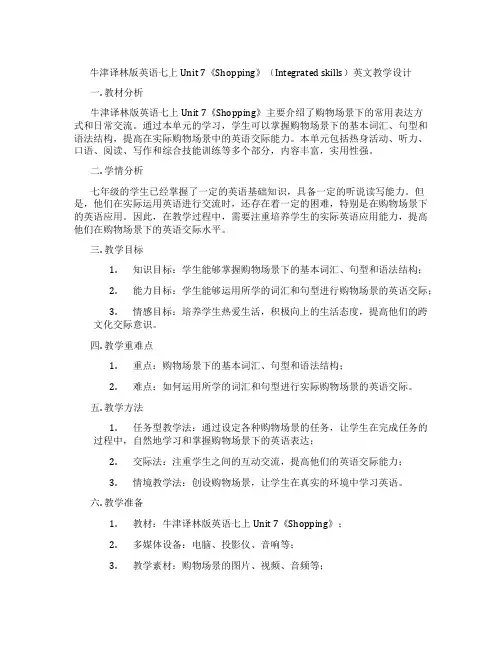
牛津译林版英语七上Unit 7《Shopping》(Integrated skills)英文教学设计一. 教材分析牛津译林版英语七上Unit 7《Shopping》主要介绍了购物场景下的常用表达方式和日常交流。
通过本单元的学习,学生可以掌握购物场景下的基本词汇、句型和语法结构,提高在实际购物场景中的英语交际能力。
本单元包括热身活动、听力、口语、阅读、写作和综合技能训练等多个部分,内容丰富,实用性强。
二. 学情分析七年级的学生已经掌握了一定的英语基础知识,具备一定的听说读写能力。
但是,他们在实际运用英语进行交流时,还存在着一定的困难,特别是在购物场景下的英语应用。
因此,在教学过程中,需要注重培养学生的实际英语应用能力,提高他们在购物场景下的英语交际水平。
三. 教学目标1.知识目标:学生能够掌握购物场景下的基本词汇、句型和语法结构;2.能力目标:学生能够运用所学的词汇和句型进行购物场景的英语交际;3.情感目标:培养学生热爱生活,积极向上的生活态度,提高他们的跨文化交际意识。
四. 教学重难点1.重点:购物场景下的基本词汇、句型和语法结构;2.难点:如何运用所学的词汇和句型进行实际购物场景的英语交际。
五. 教学方法1.任务型教学法:通过设定各种购物场景的任务,让学生在完成任务的过程中,自然地学习和掌握购物场景下的英语表达;2.交际法:注重学生之间的互动交流,提高他们的英语交际能力;3.情境教学法:创设购物场景,让学生在真实的环境中学习英语。
六. 教学准备1.教材:牛津译林版英语七上Unit 7《Shopping》;2.多媒体设备:电脑、投影仪、音响等;3.教学素材:购物场景的图片、视频、音频等;4.作业布置:提前为学生准备相关的购物场景练习题。
七. 教学过程1.导入(5分钟)利用多媒体展示购物场景的图片和视频,引导学生谈论购物话题,激发他们的学习兴趣。
2.呈现(10分钟)教师通过展示PPT,呈现本节课的主要词汇、句型和语法结构,并用简单的英语进行解释。
牛津英语7A Unit 7 Shopping教学设计及反思Teaching goals1. To recognize new words and phrases in the dialogues2. To use expressions about shopping.3. To learn to help children in poor areas.Teaching proceduresStep 1: Lead-inEnjoy a video, introduce something about Christmas.Step 2: Learn some new words and phrasesStep 3: Listen to the tape then ask students to answer an easy question.What does Amy buy for Simon and Sandy as Christmas presents?Step 4: Reading and answeringAsk students to read two dialogues together to learn more information about Amy’s shopping, and then answer some questions and finish T or F exercises. Step 5: Students work in groups and finish blank fillings.Step 6: An activity about going shoppingStep 7: Discussion: How do you usually use your pocket money?Ask students to discuss it with their group members.Show students a video about some children in poor areas, and tell them pocket money can be saved to help children in poor areas.Step 8: HomeworkUnit 7 Reading Going Shopping学案Task3. Please fill in blanks according to what we have learnt.In the first shop, Amy wants to buy some football cards for _____ . The new football cards are ___ yuan each. Amy thinks they’re not ______. The shopkeeper says last y ear’s cards are only _____ yuan each. But Amy _______ to buy new cards. At last, she buys _____new football cards.In the second shop, Amy wants to buy a _____for Sandy. Amy buys __________ in the shop. They’re ______ and they ______ Sandy’s pink coat. Am y only has _______ yuan but that’s _______ . They ______ Amy _____ yuan.Task4. When we go shopping, we will have a talk with the shopkeepers first. Can you find out some useful word or sentences in Amy’s dialogue?the shopkeeper says: the shopper says:________________________________ _______________________________ ________________________________ _______________________________ ________________________________ _______________________________ ________________________________ _______________________________ ________________________________ _______________________________ ________________________________ _______________________________ Task5. Discussion.How do you usually use your pocket money?教学反思这节课开设的内容是unit7的reading部分,教案设计以shopping为主题,以圣诞节为切入点,进行教学。
牛津译林版七年级上册Unit 7《Shopping》(第3课时)教学设计一. 教材分析牛津译林版七年级上册Unit 7《Shopping》主要介绍了一些与购物相关的日常用语。
通过本节课的学习,学生能够掌握一些基本的购物用语,如“How much is it?”,“Can I try it on?”等,并能够运用这些用语进行简单的购物交流。
同时,学生还能够了解一些常见的购物场景,如服装店、鞋店等。
二. 学情分析七年级的学生已经具备了一定的英语基础,能够听懂并运用一些简单的日常用语进行交流。
但是,对于一些特定的购物场景和用语,学生可能还比较陌生。
因此,在教学过程中,需要注重引导学生理解和运用这些新的词汇和句型。
三. 教学目标1.知识目标:学生能够掌握一些基本的购物用语,如“How much is it?”,“Can I try it on?”等,并了解一些常见的购物场景。
2.能力目标:学生能够运用所学的购物用语进行简单的购物交流,并能够正确使用一般现在时。
3.情感目标:通过本节课的学习,学生能够培养对英语学习的兴趣,提高自信心。
四. 教学重难点1.重点:学生能够掌握一些基本的购物用语,并能够运用这些用语进行简单的购物交流。
2.难点:学生能够正确使用一般现在时,并在实际情境中灵活运用所学的购物用语。
五. 教学方法1.情境教学法:通过设定购物场景,让学生在实际情境中学习和运用所学的购物用语。
2.交际教学法:通过分组练习和角色扮演,让学生在实际交流中提高口语表达能力。
3.任务型教学法:通过完成购物任务,让学生在实践中运用所学的购物用语。
六. 教学准备1.教师准备一些与购物相关的物品,如衣服、鞋子等,用于展示和示范。
2.教师准备一些与购物相关的图片,用于引导学生进行想象和表达。
3.教师准备一份详细的教学计划,包括每个环节的内容和时间安排。
七. 教学过程1.导入(5分钟)教师通过展示一些与购物相关的物品和图片,引导学生谈论自己喜欢的购物方式和购物经历。
总课题Unit 7 shopping 总课时第课时课题Grammar 课型New
教学目标知识目标
1. To learn to use some or any to talk about the amount of
something.
2. To learn to use there be to show about something exists.能力目标
To develop the Ss’ ability of finding and identifying things’
natural law.
情感目标none
教学重点The usages of some/any and there be
教学难点To learn how to understand and use some/any and there be correctly 课前预习Preview some,any and there be
教学反思:
教学反思:
教学反思:
总课Know yourself 总课时8 第 1 课时课题Comic strip and Welcome to the unit
课型新授授课日期
教学目标1掌握本课出现的重点语言点。
2学会用适当的语言描述人的性格特点。
3学会简单谈论自己和他人的性格特点及喜欢或不喜欢的职业。
教学重点1掌握本课出现的重点语言点。
2学会用适当的语言描述人的性格特点。
教学难3学会简单谈论自己和他人的性格特点及喜欢或不喜欢的职业。
Unit 7 ShoppingComic strip and W elcome to the unit教学目标1学习常见的商店名称。
2学会用英语就购买礼物的话题展开对话。
教学内容四会内容词汇:shopping mall down hate well money wallet carrybookshop gift sure maybe stamp collect词组:down the street go shopping come with me carry all the bags clothes shop flower shop gift shop shoe shop sports shop toy shop buy Simon a present be interested in句型:I want to buy Simon a present.Do you have any ideas?I’m not sure.That’s a good idea.Y ou’re welcome.三会内容词汇:CD教学准备1图片、实物2教学挂图。
3录音机。
4多媒体课件背景知识此部分介绍了为学生的生日而购买礼物的情境。
鼓励学生使用英语谈论受欢迎的礼物。
对于很多年轻人来说,生日是一年中的亮点。
不同的文化环境下,庆祝生口的方法也各不相同。
送人生日礼物的传统很早以前起源千欧洲。
人们认为在朋友生日那天带着美好的愿望去拜访.可以保护朋友免受邪恶的伤害。
而礼物更能保护朋友,使其免受那些意欲占据其身体的恶魔的侵害。
不同的国家也有着一些相似的传统。
很多传统都把蜡烛和蛋糕作为庆祝的一部分。
在英国,有专门为庆典而准备的特别的生日蛋糕。
一些人认为放一枚硬币在蛋糕里将使寿星变得富有。
教学步骤Welcome to the unitStep I导入1创设真实情境导入赠送礼物和购物的话题。
在课前了解当天是否有学生过生日,如果有,教师可以将事先准备好的生日礼物送给这位学生并说:Happy birthday. 如果当天没有,也可以把礼物送给最近过生口的学生。
教师说I bought this birthday present in a gift shop near my home We often buy birthday presents for the people we love Can you tell me where you can buy presents?将81页A部分八个商店的图片展示给学生,说:We can buy different things in different shops Do you know what shops they are?2在学习这些商店的名称时,教师要带读,并与学生讨论在这些商店可以买到什么,以及在某个商店买的东西适合送给什幺人作礼物。
(1)What’s this shop?(2)What can we buy here?(3)Who can we buy a present for from the shop?3请学生完成A部分的书写任务。
Step II呈现1呈现讨论购买礼物的对话。
教师说:Daniel wants to buy a Christmas present for Simon He Is asking Millie for help Listen to the dialogue and tell me what they decide to buy播放录音,请学生合上书听。
请一位学生回答问题:Some stamps并问:"Where can they buy stamps for Simon?2全体学生集体朗读对话。
如有理解困难的句子,教师进行讲解。
3自由谈论购买礼物的话题。
教师说:S1’s(班上某个最近要过生日的学生) birthday is coming .I want to buy him/her a present .Do you have any good ideas?请几位学生用教材B 部分对话提供的语言谈一谈自己的想法,买什么礼物以及在哪里买,并就他们提出的意见进行交流。
Step III练习1.对话编排和表演。
2.给学生三分钟时间准备他们自己的对话,然后请几组学生上来展示Comic stripStep I呈现1呈现Hobo和Eddie的图片,教师说:Hobo is going shopping and he asks Eddie to go with him.Do you think Eddie will do that?鼓励学生根据他们对Eddie的了解,猜测结果。
2播放Comic strip部分的录音,学生听完后检查猜测结果并回答问题:(1)Does Eddie want to go shopping with Hobo? (No,he doesn,t)(2)Why does Hobo ask Eddie to go with him? (Because he wants Eddie to carry all the bags.) 让学生找出对话的难点,教师有选择性地板书并进行解释。
Step II练习1用所给单词和词组完成短文。
There’s a new mall ___________________(down the street). Hobo wants to____________(go shopping),but Eddie_______________(hates) it.Hobo has no ____________(money).Eddie gives his_____________(wallet)to Hobo. Hobo can’t ___________________(carry all the bags).He is asking Eddie for help,“Eddie,please_____________(come with)me I ___________(need) you______________(to) help me”2在理解漫画内容的基础上让学生两人一组分角色朗读对话,教师巡视指导。
3让学生进行角色表演,鼓励他们积极想像,适当增加合理内容,对想像大胆语言丰富的学生给予充分赞许,提高他们创新思维的积极性。
Step III家庭作业1记忆本课出现的例汇、词组和句型。
2背诵对话部分内容。
3预习Reading的生词。
Reading教学目标1增强学生的晤篇意识。
2使用适当的语言描述自己的需要。
3从对话中了解关于购物的信息。
教学内容四会内容:词汇:cost cheap last match pink pretty enough change词组:just a minute take a look last year different kinds of different from句型Can I help you? How much do they cost? What can I do for you?They match her pink coat. I’ll take them. Here’s your change.三会内容词汇:shopkeeper教学准备1图片、实物2教学挂图。
3录音机。
4多媒体课件教学步骤Reading 1Step I导入1创设真实情境,引导并帮助学生学习生词和词组。
教师说:Many girls in our class have hair clips. Their hair clips are very pretty.(To one girl:) Can I take a look at your clips? Wow, they’re pink. They match your clothes well.How much do they cost? Ten yuan each? They are not cheap.(To another girl:) Oh,your hair clips are different from hers May I take a look? They are yellow.Are they cheap? 5 yuan each? They are cheap but they are also beautiful. Who buys things like hair clips for you? Mum? Oh,yes,I also often buy many kinds of hair clips for my daughter. I think girls look pretty with colourful hair dips.2板书画线的生词和短语,同时重复刚才的语境,让学生根据语境猜测词义。
3让学生完成教材第83页B1部分的配对练习。
(1)---How much do these football cards cost?---______________________.(One yuan each)(2)---Sandy ,come here,please.---_______________________, I’m coming.(3) Let’s __________________ at these CDs (take a look).(4) I’ll ________ a toy _______ little Tom.It’s his birthday tomorrow.(buy;for)(5) There are ____________________books in this bookshop. (many kinds of)Step II呈现1让学生合上书.教师展示Amy购物的第一幅图片,学生根据图片同答问题:(1)Where is Amy ? (In a shop)(2)What is Amy buying? (Some cards)2让学生看图片,听Reading的第一段录音,回答问题:(1)How much do the new cards cost? (Two yuan each)(2)How much do last year%cards cost? (One yuan each)3出示Amy购物的第二幅图片、让学生根据图片回答问题:What’s Amy buying?(Some hair clips)4继续看第二幅图片,听第二段录音,回答问题:(1)How much money does Amy have? (Fifteen yuan)(21 How much are the hair clips? (Nine yuan.)Step Ⅲ练习1学生集体跟磁带朗读对话,然后把全班学生分成两组,分角色朗读两段对话。